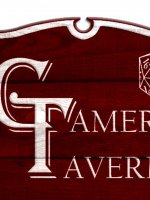Dark Horse Comics announced a licensing deal with Wizards of the Coast for new comic books based on Dungeons & Dragons and Magic: The Gathering.
From the press release:
Dark Horse Comics and Hasbro's Wizards of the Coast announce an exciting new publishing line beginning in 2025, with comics and graphic novels expanding the worlds of DUNGEONS & DRAGONS and MAGIC: THE GATHERING! The officially licensed publishing program will feature original stories based on the popular fantasy roleplaying and trading card games. The first of these series will debut in summer 2025.
Dark Horse Comics first collaborated with Wizards of the Coast for MAGIC: THE GATHERING tie-in comics in the late '90s with MAGIC: THE GATHERING: Gerrard's Quest and has more recently collaborated for the Stranger Things and DUNGEONS & DRAGONS miniseries. In this new era of MAGIC: THE GATHERING and DUNGEONS & DRAGONS, fans can expect comic series, graphic novels, art books and more. Stay tuned for more news and announcements to follow!
"If you'd told my 12-year-old self I'd get to work with incredible writers and artists to craft comics for DUNGEONS & DRAGONS and MAGIC: THE GATHERING, alongside such thoughtful and creative stewards of these licenses, I wouldn't have believed you," said senior editor Spencer Cushing. "The opportunity to work with Wizards of the Coast is a dream come true."
"Having the opportunity to work with the Wizards of the Coast team on both DUNGEONS & DRAGONS and MAGIC: THE GATHERING is one of the most exciting opportunities I’ve had professionally,” added editor Brett Israel. "As an avid player and fan of the various stories and planes of these two iconic games, I cannot wait to work with many highly-skilled creators on growing these universes."
"DUNGEONS & DRAGONS and MAGIC: THE GATHERING are two legendary games with incredibly strong fandoms and world-building gameplay," said Marianne James, Senior Vice President, Licensed Consumer Products at Hasbro. "We are dedicated to expanding these universes through unique brand-offerings and world-class partnerships, ultimately bringing players and fans alike new, exciting ways to engage with these iconic franchise brands. From this licensed publishing program with Dark Horse Comics, we anticipate a lot of excitement to come with new artwork and creative storytelling."
"We’re so excited to be teaming up with the incredible creatives at Dark Horse to invite fans and newcomers alike into the iconic fantasy world that has defined Magic: The Gathering for the past 30 years, told through a fresh new lens," said Jackie Jones, Vice President of Creative, Magic: The Gathering. "Each series will feature epic, high-stakes stories across Magic’s visually stunning, diverse multiverse, told through the eyes of our most iconic, complex, and compelling heroes and anti-heroes - giving readers the opportunity to experience what makes Magic so unique and awesome."
"This collaboration is akin to forging a legendary magical item! Dark Horse is just so awesome at bringing fantastical worlds to life on the page," said Jess Lanzillo, vice president of franchise and product for Dungeons & Dragons. "With D&D's vast, imaginative realms and 50 years of thrilling adventure as their canvas, I'm excited to see what will unfold. This collaboration feels like the start of something truly special."
Stay tuned for more news on upcoming DUNGEONS & DRAGONS and MAGIC: THE GATHERING projects in the near future!
Dark Horse is currently owned by Embracer Group, which is currently undergoing a corporate restructuring that has it splitting into three companies. The tabletop arm of Asmodee has already split off, while Dark Horse Comics is expected to stay with Middle-Earth Enterprises & Friends along with the company’s AAA game studio holdings.
Dark Horse Comics is best known for publishing Hellboy, but has a long history of licensed gaming comics including Cyberpunk, Dragon Age, Mass Effect, Tomb Raider, The Witcher, Assassin’s Creed, HALO, and many other licensed video game properties. Dark Horse has also previously brushed up against tabletop roleplaying by publishing officially licensed Critical Role comics and worked with the previous licensed publisher of D&D comics, IDW, to publish Stranger Things Dungeons & Dragons.




